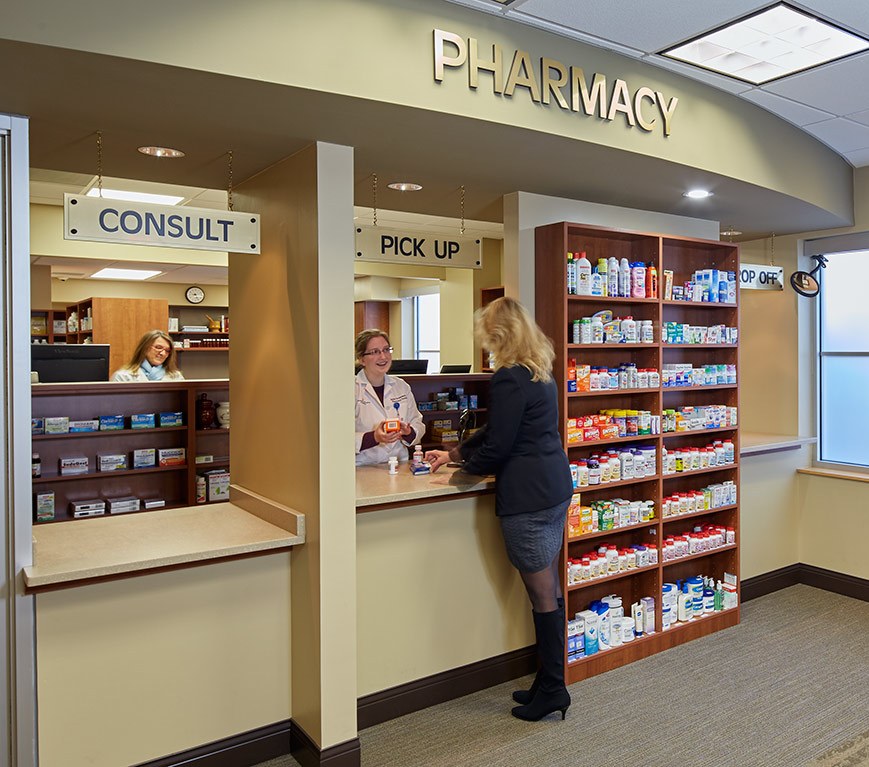Types of Pharmacies
Not a One-Size-Fits-All Model
When it comes to pharmacies there is not a one-size-fits-all model. There are several types of pharmacies that exist within our healthcare system and each is designed to serve a unique purpose. The pharmacists job in each of these facilities can vary but all involve regulating and managing the patient, and drugs and pharmaceuticals.
Types of pharmacies:
- Community Pharmacy
- Hospital Pharmacy
- Clinical Pharmacy
- Industrial Pharmacy
- Compounding Pharmacy
- Consulting Pharmacy
- Ambulatory Care pharmacy
- Regulatory Pharmacy
- Home Care Pharmacy
Community Pharmacy
Community pharmacies are also known as retail pharmacies and are the most common and well-known type of pharmacy. Most are attached to a commercial store and provide a combination of over-the-counter and prescription medications. Prescription orders are compounded and dispensed at community pharmacies. Community pharmacists are considered the most accessible health professionals and can provide healthcare advice on a walk-in basis without an appointment. Community pharmacies range from individually owned and operated to large retail chains. [1]
Hospital Pharmacy:
Hospital pharmacies exist as a department within the hospital. Medications are prepared, compounded, stocked and dispensed to patients within the hospital. Hospital pharmacies typically stock a larger range of medications, those of which are more specialized and investigational (some that are being studied and not yet approved).
Hospital pharmacies provide a much larger volume of medication per day which is allocated to the wards and intensive care units in accordance with patients medication schedule. Some hospital pharmacists may also compound sterile products for patients medications that are given intravenously such as neonatal antibiotics and chemotherapy. [2]
Clinical Pharmacy
Clinical pharmacists provide direct patient care that optimizes the use of medication and promotes health, wellness and disease prevention. Clinical pharmacists often work with physicians, nurses, and other healthcare professions to provide a holistic care plan for the patient. [3]
Clinical pharmacists have extensive education in the biomedical, pharmaceutical, social behavioral and clinical sciences. Most have a Doctor of Pharmacy degree and postgraduate training. In some states clinical pharmacists are given prescriptive authority under protocol with a medical provider. [4]
Industrial Pharmacy
Industrial pharmacies are where medicines are researched and designed. Industrial pharmaceutical laboratories are where clinical trials are conducted on patients, technology is used to synthesize new chemicals and suggested course treatment for new pharmaceuticals are developed.
Industrial pharmacists sometimes work in manufacturing plants or around hazardous material. Industrial pharmacists require similar education as those who provide medication to patients.
“The traditional role of compounding pharmacies is to make drugs prescribed by doctors for specific patients with needs that can’t be met by commercially available drugs, says Linda D. Bentley, JD, chair of the FDA practice group at the Boston offices of Mintz, Levin, Cohn, Ferris, Glovsky, and Popeo P.C.
Benley offers two examples:
- A young child may need a small, liquid dose of a drug made only in adult-dosage tablets.
- A person may be allergic to one of the ingredients in the commercial version of a drug.
In such cases, a compounding pharmacy would make the proper dosage and form of the drug without any offending ingredients.” [5]
Consulting Pharmacy
In the US, a consultant pharmacist focuses on reviewing and managing the medication regimens of patients, particularly those in institutional settings such as nursing homes. Consultant pharmacists ensure their patients’ medications are appropriate, effective, as safe as possible and used correctly; and identify, resolve, and prevent medication-related problems that may interfere with the goals of therapy. [6]
Ambulatory Care Pharmacy
“Ambulatory Care Pharmacy addresses the provision of integrated, accessible healthcare services of ambulatory patients transitioning from the hospital to home or another care facility.” [8] Ambulatory care pharmacists provide comprehensive medication management for a wide variety of patients with chronic health conditions. Ambulatory care pharmacists are involved in direct patient care and medication management for ambulatory patients, long-term relationships with patients, coordination of care, patient advocacy, wellness and health promotion, triage referral, patient education and self-management. [7]
Regulatory Pharmacy
Also known as government pharmacy, regulatory pharmacy is responsible for creating rules and regulations for the safe use of medicine to promote positive health outcomes. This includes pharmacists working in public health and regulatory health boards, such as the Food and Drug Administration in the United States. [9]
Home Care Pharmacy
Pharmacists specializing in in-home care provide pharmacy services and some health care treatments to patients in their homes, residential care facilities and specialty infusion centers.
In-home pharmacists prepare, dispense and deliver medication to patients in line with their care plans. In cases where patients can’t administer their own medications or therapies, they may take on some treatments directly. These typically include home-infusion therapies, such as intravenous, subcutaneous, epidural and intrathecal treatments. The role may also involve delivering and setting up equipment and supplies to support patients’ treatment needs over time. [10]
MedifriendRx®
The medifriendRx® kiosk is available to serve a certain portion of the pharmacies we have listed above such as in community and hospital pharmacies. The medifriendRx® kiosk is attached to the license of a pharmacy and placed in a medical setting such as hospital, physicians office or clinic and serves as a pharmacy window. The pharmacist operates the kiosk remotely which frees the pharmacist to perform other essential tasks it takes to run a successful pharmacy.
To learn more about how the MedifriendRx® pharmaceutical kiosk can help improve your healthcare business contact us directly at hello@medifriendrx.com.
References:
[1] https://www.news-medical.net/health/Community-Pharmacy.aspx
[2] Holdford, David (2017). Introduction to Acute and Ambulatory Care Pharmacy Practice, Second Edition. pp. 21–26. ISBN 1585285455.
[3] American College of Clinical Pharmacy (June 2008). “The definition of clinical pharmacy” (PDF). Pharmacotherapy. 28 (6): 816–7. doi:10.1592/phco.28.6.816. PMID 18503408. S2CID 45522678.
[4] “Collaborative drug therapy management (CDTM)”. Pharmacist’s Letter/Prescriber’s Letter. 25: 250801. 2009.
[5] https://www.webmd.com/brain/news/20121010/what-are-compounding-pharmacies
[6] “What is a Consultant Pharmacist?”. American Society of Consultant Pharmacists. Archived from the original on 2 April 2015. Retrieved 11 March 2015.
https://web.archive.org/web/20150402132814/https://www.ascp.com/articles/what-consultant-pharmacist
[8] https://www.bpsweb.org/media/ambulatory-care-pharmacy-fact-sheet/
[9] https://www.news-medical.net/health/Types-of-Pharmacy.aspx
[10] https://work.chron.com/duties-registered-pharmacists-inhome-care-28671.html









